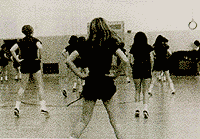Departments:
High school transcendental
 He
was making documentaries when Ken Burns was in high
school. Speaking of High School...
He
was making documentaries when Ken Burns was in high
school. Speaking of High School...
Looking
like Yoda at a Manhattan literary soirée, award-winning documentary
filmmaker Frederick Wiseman appeared all eyes (deep--set and deeply
hooded) and ears (elfin and acute). Seated before the fireplace
in the Ida Noyes Library, the three-time Emmy winner was awaiting
questions from a U of C audience, fresh from a Doc Films screening
of his 1968 film, High School. The November 8 event coincided
with his visit to campus as the 44th recipient of Chicago's Rosenberger
Medal, awarded by the faculty. First given in 1944, the medal
recognizes "achievement through research, in authorship, in invention,
for discovery, for unusual public service, or for anything deemed
to be of great benefit to humanity."
 The
Rosenberger criteria say nothing about humor, but High School
evoked its share of laughs all evening. Many came in rueful
recognition of long-ago styles (ironed hair, love beads, and a
baggy one-piece gym uniform that I had almost managed to forget).
The first question was from a young man who wondered if the film
had evoked similar guffaws back in 1968, or if its humor was due
to the passage of 31 years?
The
Rosenberger criteria say nothing about humor, but High School
evoked its share of laughs all evening. Many came in rueful
recognition of long-ago styles (ironed hair, love beads, and a
baggy one-piece gym uniform that I had almost managed to forget).
The first question was from a young man who wondered if the film
had evoked similar guffaws back in 1968, or if its humor was due
to the passage of 31 years?
The
answer began as a non-sequitur: "Several times during the shooting,
I had to be taken to the local hospital to have sutures put in--after
I bit through my tongue." The filmmaker held his deadpan expression
until the first burst of laughter.
With
that, the Q & A was off and running. How long does it take for
Wiseman's subjects to get used to the filmmaker's presence? "It
doesn't take any time at all," he said. "I always use material
in each of the films that was shot the first day."
After
Wiseman had shot "around 75 to 80 hours" of film at Philadelphia's
Northeastern High, how did he begin editing the film down to its
75 minutes of running time? "The initial editing is done on the
pleasure principle--what amuses or interest me," Wiseman replied,
adding that "the basic technique of editing is to sit in the chair,"
immersed in the film and all its details, "till the movie's done."
And,
said the man who has edited all of his own films--from 1967's Titicut
Follies, about the treatment of mental patients at a Massachusetts
facility, to a study of a small town, Belfast, Maine, due
on PBS in February--he can't understand filmmakers who don't do
the same: "What's helped me the most is editing the films myself.
When I start a new movie, I can remember a type of shot I had
trouble with in the last movie and take steps to avoid it."
Has
he kept in touch with any one from High School? "I deliberately
don't do that," he said. "I don't make a movie to make new friends.
When it's done, I go off to make another movie."
How
did his High School subjects feel about the way the film
portrayed them? "The reason you can make these kind of films,"
Wiseman said, "is that most of us feel what we're doing is right."
With High School, he admitted, "the teachers liked it when they
first saw it. Then they read the reviews and decided they didn't
like it anymore."
What's
the medium's appeal? "I think I switched to film because I wasn't
going to be a very good novelist," he said, then got serious.
While critics call him a chronicler of institutions--high schools,
prisons, ballet corps--he disagreed: "My subject is ordinary experience.
Institutions just give me a way to look at ordinary experience
in a confined time and space."
It's
past 10 o'clock and time for the last question: Would Frederick
Wiseman allow someone to make a documentary about his own life?
"Absolutely not," the master responded with Yoda calm. "I know
too much to allow anybody to make a movie about me." --M.R.Y.


![]()
 He
was making documentaries when Ken Burns was in high
school. Speaking of High School...
He
was making documentaries when Ken Burns was in high
school. Speaking of High School...  The
Rosenberger criteria say nothing about humor, but High School
evoked its share of laughs all evening. Many came in rueful
recognition of long-ago styles (ironed hair, love beads, and a
baggy one-piece gym uniform that I had almost managed to forget).
The first question was from a young man who wondered if the film
had evoked similar guffaws back in 1968, or if its humor was due
to the passage of 31 years?
The
Rosenberger criteria say nothing about humor, but High School
evoked its share of laughs all evening. Many came in rueful
recognition of long-ago styles (ironed hair, love beads, and a
baggy one-piece gym uniform that I had almost managed to forget).
The first question was from a young man who wondered if the film
had evoked similar guffaws back in 1968, or if its humor was due
to the passage of 31 years?